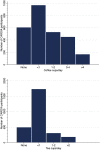Coffee and tea consumption in the early adult lifespan and left ventricular function in middle age: the CARDIA study
- PMID: 32449612
- PMCID: PMC7373924
- DOI: 10.1002/ehf2.12684
Coffee and tea consumption in the early adult lifespan and left ventricular function in middle age: the CARDIA study
Abstract
Aims: The long-term impact of coffee or tea consumption on subclinical left ventricular (LV) systolic or diastolic function has not been previously studied. We examined the association between coffee or tea consumption beginning in early adulthood and cardiac function in midlife.
Methods and results: We investigated 2735 Coronary Artery Risk Development in Young Adults (CARDIA) study participants with long-term total caffeine intake, coffee, and tea consumption data from three visits over a 20 year interval and available echocardiography indices at the CARDIA Year-25 exam (2010-2011). Linear regression models were used to assess the association between caffeine intake, tea, and coffee consumption (independent variables) and echocardiography outcomes [LV mass, left atrial volume, and global longitudinal strain (GLS), LV ejection fraction (LVEF), and transmitral Doppler early filling velocity to tissue Doppler early diastolic mitral annular velocity (E/e´)]. Models were adjusted for standard cardiovascular risk factors, socioeconomic status, physical activity, alcohol use, and dietary factors (calorie intake, whole and refined grain intake, and fruit and vegetable consumption). Mean (standard deviation) age was 25.2 (3.5) years at the CARDIA Year-0 exam (1985-1986), 57.4% were women, and 41.9% were African-American. In adjusted multivariable linear regression models assessing the relationship between coffee consumption and GLS, beta coefficients when comparing coffee drinkers of <1, 1-2, 3-4, and >4 cups/day with non-coffee drinkers were β = -0.30%, P < 0.05; β = -0.35%, P < 0.05; β = -0.32%, P < 0.05; β = -0.40%, P > 0.05; respectively (more negative values implies better systolic function). In adjusted multivariable linear regression models assessing the relationship between coffee consumption and E/e´, beta coefficients when comparing coffee drinkers of <1, 1-2, 3-4, and >4 cups/day with non-coffee drinkers were β = -0.29, P < 0.05; β = -0.38, P < 0.01; β = -0.20, P > .05; and β = -0.37, P > 0.05, respectively (more negative values implies better diastolic function). High daily coffee consumption (>4 cups/day) was associated with worse LVEF (β = -1.69, P < 0.05). There were no associations between either tea drinking or total caffeine intake and cardiac function (P > 0.05 for all).
Conclusions: Low-to-moderate daily coffee consumption from early adulthood to middle age was associated with better LV systolic and diastolic function in midlife. High daily coffee consumption (>4cups/day) was associated with worse LV function. There was no association between caffeine or tea intake and cardiac function.
Keywords: Coffee; Left ventricle; Left ventricular function; Tea; caffeine.
© 2020 The Authors. ESC Heart Failure published by John Wiley & Sons Ltd on behalf of European Society of Cardiology.
Conflict of interest statement
The authors have no conflict of interest relevant to this manuscript.
Figures


References
-
- Benjamin EJ, Muntner P, Alonso A, Bittencourt MS, Callaway CW, Carson AP, Chamberlain AM, Chang AR, Cheng S, Das SR, Delling FN, Djousse L, Elkind MSV, Ferguson JF, Fornage M, Jordan LC, Khan SS, Kissela BM, Knutson KL, Kwan TW, Lackland DT, Lewis TT, Lichtman JH, Longenecker CT, Loop MS, Lutsey PL, Martin SS, Matsushita K, Moran AE, Mussolino ME, O'Flaherty M, Pandey A, Perak AM, Rosamond WD, Roth GA, Sampson UKA, Satou GM, Schroeder EB, Shah SH, Spartano NL, Stokes A, Tirschwell DL, Tsao CW, Turakhia MP, VanWagner LB, Wilkins JT, Wong SS, Virani SS. Heart disease and stroke statistics—2019 update: a report from the American Heart Association. Circulation 2019. Mar 5; 139: e56–e528. - PubMed
-
- Wilhelmsen L, Rosengren A, Eriksson H, Lappas G. Heart failure in the general population of men‐‐morbidity, risk factors and prognosis. J Intern Med 2001; 249: 253–261. - PubMed
Publication types
MeSH terms
Substances
Grants and funding
LinkOut - more resources
Full Text Sources
Miscellaneous

